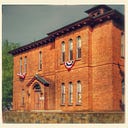Basil O’Connor
by William F. Hanna
D. Basil O’Connor, the son of a metalworker and a housewife, was born in Taunton on January 8, 1892. Later he would tell people that one of his earliest memories was as a 10-year old boy selling the Taunton Daily Gazette on street corners. Angered by what he considered poor working conditions and low wages, he organized the city’s newsboys; together they demanded that the company improve the lot of its youngest employees.
Years later, remembering his upbringing, O’Connor praised the values that had been instilled in him by his parents. “By chance,” he said, “I had a mother who had a passion for education, and a father who believed in putting his children on their own. . . . “ That love of education and hard work carried through his entire life. He graduated from Taunton High School in the Class of 1908 and then worked his way through Dartmouth College by playing fiddle in a dance band. After graduating from Harvard Law School in 1915, he went into the practice of law in Boston.
In 1920, O’Connor moved to New York, where he befriended Franklin Delano Roosevelt, a fellow Harvard grad who in that year was the Democratic Party’s unsuccessful nominee for vice president. Deeply affected when FDR was stricken with polio in the summer of 1921, O’Connor took particular interest in the ramshackle summer resort at Warm Springs, Georgia where the future president retreated for therapy. In 1924, O’Connor and Roosevelt formed a law partnership and in 1927 the two men, joined by a few friends, established the Warm Springs Foundation, which transformed the rundown resort into a renowned polio treatment center. At FDR’s request, O’Connor served as treasurer and later president of the Foundation.
In 1934, the year after FDR assumed the presidency, the Foundation began fund raising on a grand scale and among its most successful events was the annual celebration of Roosevelt’s birthday. In 1938 the Foundation was reorganized as the National Foundation, more popularly known simply as the March of Dimes. O’Connor served as its president for the next 34 years, during which, The New York Times estimated, he collected and spent more than seven billion dimes, many given by school children in the fight against polio. The Times quoted a prominent researcher who said that “O’Connor practically invented virology.”
Although his organizational talents were always in demand — among other things he was an original member of FDR’s political “brain trust,” and he was also a chairman of the American Red Cross — O’Connor’s lifelong interest was in raising money for medical research. In the late 1940s and ’50s he collected millions of dollars to fund Dr. Jonas Salk’s polio vaccine. He also helped raise funds for Dr. Albert Sabin’s oral polio vaccine, developed five years after Salk’s initial breakthrough. Additionally, his organization spent millions of dollars training physical therapists to assist those who had been stricken with the disease.
Although he was no longer living in Taunton, O’Connor visited occasionally and remained in close touch with several friends in the city. In November 1944, he returned to Taunton to receive an award from the Massachusetts chapter of the American Red Cross. He was touched that evening when, amidst the accolades of local and state officials, the city’s head librarian presented him with an engraved Reed & Barton plate, simply inscribed: “To Basil O’Connor, a son of our city who has made his mark in the world. Presented by his fellow citizens of Taunton on Thursday, November 9, 1944.”
As O’Connor rose in prominence, his parents maintained the family homestead at 158 Highland Street. The activities of Basil and his siblings were frequently mentioned in local newspapers. John O’Connor, one of Basil’s two brothers — both of whom were lawyers — was a member of Congress from New York while a sister, Mary, was an elementary school supervisor in Natick, Massachusetts. Both his parents and sister Mary are buried in St. Francis Cemetery in Taunton.
After seeing the war against polio largely won, O’Connor turned his attention to helping the March of Dimes raise huge sums for research into preventing birth defects, an effort that continued throughout the remainder of his life. He died at age 80 on March 9, 1972, while in Arizona for a meeting of the organization’s scientific advisory committee.
When word of his death was announced, praise for O’Connor poured in from around the world. Perhaps the most eloquent tribute, however, had been spoken 10 years before, at a testimonial held in his honor in New York City. That evening, amid tributes by Presidents Harry S. Truman, Dwight D. Eisenhower and John F. Kennedy, Dr. Jonas Salk took the floor to speak of his old friend, O’Connor. In his remarks, and with the former Taunton newsboy listening, Dr. Salk said, “What a rare human this is, and how rare has been my good fortune [to know him]. . . . He has created and led movements. He himself has become an institution.”
